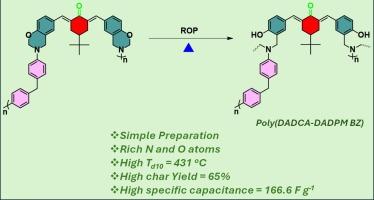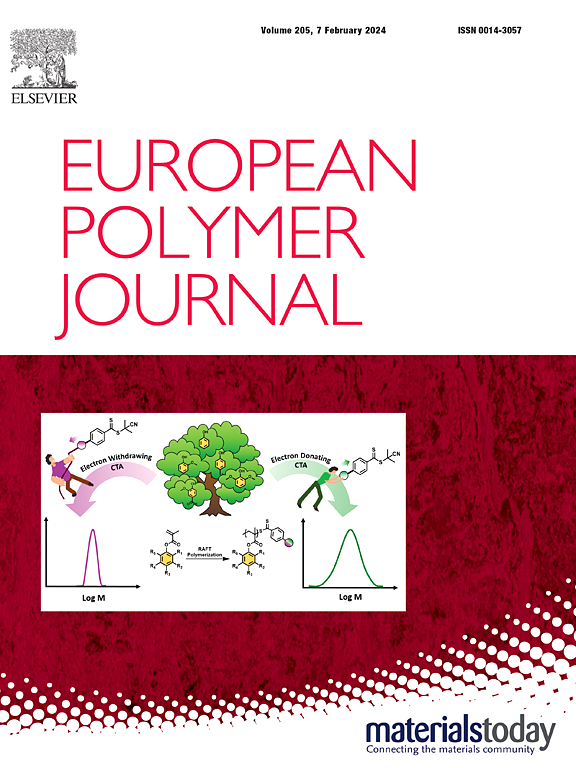高效合成用于超级电容器储能的含叔丁基环己酮和二苯基甲烷单元的主链热固性聚苯并恶嗪树脂
IF 5.8
2区 化学
Q1 POLYMER SCIENCE
引用次数: 0
摘要
开环聚合(ROP)可以从各自的苯并恶嗪单体合成聚苯并恶嗪(PBZ)前体,从而得到热固性酚醛树脂。在本研究中,我们使用 4-(叔丁基)-2,6-双((E)-4-羟基苯亚甲基)环己烷-1-酮(DADCA)和 4,4′-二氨基二苯基甲烷(DADPM)与多聚甲醛合成了 DADCA-DADPM BZ。在 110 至 250 °C 的温度范围内进行热固化聚合后得到的 DADCA-DADPM BZ 和 poly(DADCA-DADPM BZ)_X 材料被用作超级电容器(SC)电极制备中的电活性材料。差示扫描量热法(DSC)和热重分析(TGA)显示,热固化温度为 230 ℃,炭化率为 35 wt%,分解温度(Td10)为 288 ℃。评估了电活性材料 DADCA-DADPM BZ 和 poly(DADCA-DADPM BZ)_X 材料在 SC 中的适用性,根据热固化温度(110-250 °C)的不同,其比电容范围为 84.6 至 166.6 F g-1。值得注意的是,聚(DADCA-DADPM BZ)_250 在电流密度为 10 A g-1 的条件下循环使用 5000 次后仍能保持 60% 的电容效率,这突显了其可回收利用的潜力。本文章由计算机程序翻译,如有差异,请以英文原文为准。

Efficient synthesis of main chain thermosetting polybenzoxazine resin containing tert-butylcyclohexanone and diphenylmethane units for supercapacitor energy storage
Ring-opening polymerization (ROP) can synthesize polybenzoxazine (PBZ) precursors from their respective benzoxazine monomers, resulting in thermosetting phenolic resins. In this study, we synthesized DADCA-DADPM BZ using 4-(tert-butyl)-2,6-bis((E)-4-hydroxybenzalidene)cyclohexan-1-one (DADCA) and 4,4′-diamino-diphenylmethane (DADPM) with paraformaldehyde. The resulting DADCA-DADPM BZ and poly(DADCA-DADPM BZ)_X materials were obtained after thermal curing polymerization at temperatures ranging from 110 to 250 °C were employed as electroactive materials in electrode preparation for supercapacitors (SCs). Differential scanning calorimetry (DSC) and thermogravimetric analysis (TGA) revealed a thermal curing temperature of 230 °C, a char yield of 35 wt%, and a decomposition temperature (Td10) of 288 °C. The electroactive material DADCA-DADPM BZ and poly(DADCA-DADPM BZ)_X materials were evaluated for their suitability in SCs, showing a specific capacitance ranging from 84.6 to 166.6 F g−1, depending on the thermal curing temperature (110–250 °C). Notably, the poly(DADCA-DADPM BZ)_250 retained 60% of its capacitance efficiency after 5000 cycles at current density of 10 A g−1, highlighting its potential for recyclability.
求助全文
通过发布文献求助,成功后即可免费获取论文全文。
去求助
来源期刊

European Polymer Journal
化学-高分子科学
CiteScore
9.90
自引率
10.00%
发文量
691
审稿时长
23 days
期刊介绍:
European Polymer Journal is dedicated to publishing work on fundamental and applied polymer chemistry and macromolecular materials. The journal covers all aspects of polymer synthesis, including polymerization mechanisms and chemical functional transformations, with a focus on novel polymers and the relationships between molecular structure and polymer properties. In addition, we welcome submissions on bio-based or renewable polymers, stimuli-responsive systems and polymer bio-hybrids. European Polymer Journal also publishes research on the biomedical application of polymers, including drug delivery and regenerative medicine. The main scope is covered but not limited to the following core research areas:
Polymer synthesis and functionalization
• Novel synthetic routes for polymerization, functional modification, controlled/living polymerization and precision polymers.
Stimuli-responsive polymers
• Including shape memory and self-healing polymers.
Supramolecular polymers and self-assembly
• Molecular recognition and higher order polymer structures.
Renewable and sustainable polymers
• Bio-based, biodegradable and anti-microbial polymers and polymeric bio-nanocomposites.
Polymers at interfaces and surfaces
• Chemistry and engineering of surfaces with biological relevance, including patterning, antifouling polymers and polymers for membrane applications.
Biomedical applications and nanomedicine
• Polymers for regenerative medicine, drug delivery molecular release and gene therapy
The scope of European Polymer Journal no longer includes Polymer Physics.
 求助内容:
求助内容: 应助结果提醒方式:
应助结果提醒方式:


